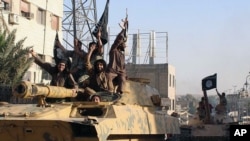On the Turkish border with Syria, Turkish lawmaker Mehmet Ali Ediboglu says he is in touch with the families of the 11 doctors and medical students that sneaked into Syrian territory held by the Islamic State (IS) group.
The families from the United Kingdom, the United States, Sudan and Canada are still hoping their children travelled to Syria to help treat civilians, not terrorists, he said.
"They are [in] a warzone. God forbid, they might be killed by an attack any minute," he said. "That's their concern and, more importantly, they want to know what their children are doing in Syria."
But some analysts say IS militants could be recruiting English-speaking doctors as part of a plan to expand their force of foreign fighters, which already number in the tens of thousands. They also say IS leaders may be putting these outsiders on the front lines as part of a longer-term strategy to fulfill the terror group's motto of “remain and expand.”
According to Sameh Seif Elyazal, head of the Al Gomhouria Center for Political and Security Studies in Cairo, the new trend, if confirmed, represents a troubling new development.
“Maybe this is a new direction that has to be monitored quite well that now they have reached a certain kind of educated people,” he said.
Describing many foreign recruits as “brainwashed,” Elyazal says their religious fervor coupled with ignorance or a desire for adventure and blood can make them susceptible to militant group's flashy online recruitment campaigns.
Those that regret signing up cannot change their minds, he adds, explaining that nearly 2,000 recruits from Asia, the Arab World and Europe have already been killed.
"‘It’s a one-way ticket. If you go back, we’ll kill you,'” Elyazal said, quoting the group's message to new recruits. "And they [have] killed [new recruits] in front of others, just to threaten them ... No one can even think about going home unless they want to send them home for a mission.”
Daniel Wagner, who heads U.S.-based security firm Country Risk Solutions, says these missions — IS fighters returning home to wage terror attacks — would be nearly impossible for authorities to prevent.
“What if these individuals change passports? What if they change identities? Then what do they do?" he said. "It raises the old problem of security services having to be right 100 percent of the time and those who want to create havoc having to be right only once.”
But reports that many foreign fighters die quickly on the front lines, or as suicide bombers, indicate the threat of foreign fighters returning home to carry out attacks may be exaggerated.
“There is some sort of paranoia that really surrounds the entire thing," said Ziad Akl, senior researcher at the Cairo-based Al-Ahram Center for Political and Strategic Studies. "There is a lot of prediction in the way the Islamic State is covered. It’s covered basically as an image or a perception. It’s not directly related to what they do or how they do it.”
Rather than worry about doomsday scenarios, he says, observers should evaluate domestic conditions that make their own nationals vulnerable to the IS propaganda. Rising unemployment, massive wealth disparities and other injustices, he says, breed “fanatic radicalism.”
Gathering information on how the militant organization is actually fighting, rather than predicting how it will fight in the future, is also critical to mitigating the threat of attacks outside of the war zone.
“The potential threat of these foreign fighters coming back and committing similar acts where they are originally from, or in their native land, seems to me something that depends on the strategy of the organization itself,” he said.
While the extremist militants are strategic in their efforts to "remain and expand," he said, exactly how the group operates can vary from country to country.





